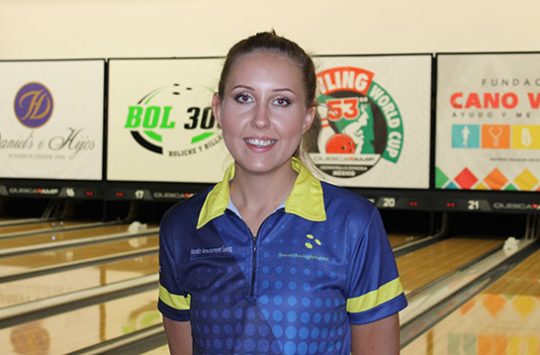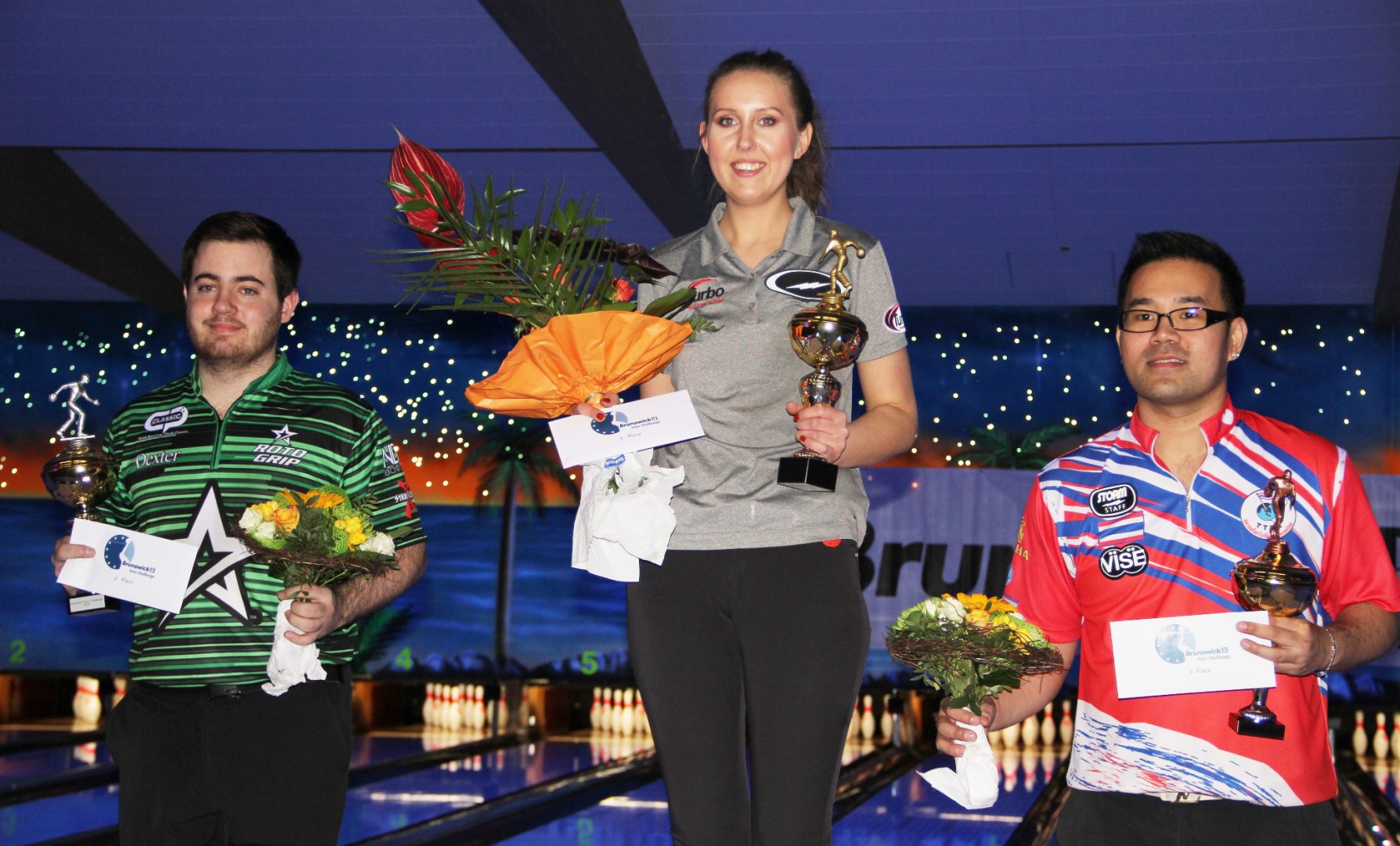A Conversation with Sweden's Jenny Wegner, 2018 Brunswick Euro Challenge Champion

Jenny Wegner, a 23-year-old Kingerdarten teacher in Sweden, now has a couple of big competitive notches on her belt after winning the 2018 Brunswick Euro Challenge in Munich, Germany, on March 18 when she held off three-time PBA Tour champion Anthony Simonsen with the help of the eight pins handicap per game given women in European Bowling Tour competition. She also won the QubicaAMF World Cup in 2016, defeating Team USA and PWBA star Danielle McEwan for that title. BJI Editor Gianmarc Manzione spoke with her about those two big wins, her thoughts on the handicap system used for women in EBT events, the famed Swedish League in which she competes, and much more.
So, would it be correct to say that the Brunswick Euro Challenge title is the biggest win of your career since you won the QubicaAMF World Cup in 2016?
Yes, I would say so.
Which achievement ranks more highly for you?
It’s hard to say. I think I would say the Brunswick Euro Challenge. There were so many good bowlers at both tournaments, but still, I would say the Euro Challenge.
You’re an interesting case when it comes to women competing against men because you are a bowler who likes to play deep and get farther left than anyone, but your opponent in the title match was a guy who has one of the PBA Tour’s highest rev rates in Anthony Simonsen. How much of a challenge did it present for you to bowl a guy who carves up the pattern as aggressively as Simonsen does?
I knew that the lanes were going to be different than they were when we started because he breaks down the lanes differently. But I was just going to try to make good shots and try to solve the problems as they come.
The title match was a tale of two games for you because you roared out with a five bagger and then had multiple open frames down the stretch — a missed 1-2-4-10 washout, two 2-8 leaves, an open 10th frame. What were you struggling with after that opening five-bagger?
The lanes were starting to break down and the ball didn’t really react the way it had before. It started to feel like a new game. I didn’t really feel like I had to find a solution, but I got a little desperate and I think I pushed the ball too hard when I released it every single shot because I really wanted to show everyone that a girl can win. I didn’t have to strike out, so that was good.
Your demeanor in big title matches like this one and in the World Cup has been very laid-back, composed and unflinching. You sort of smiled your way through that World Cup title match against Danielle McEwan, and here again in Munich you again seemed at ease throughout. What can you tell me about your poise on the lanes in big title matches?
I’m really strong mentally when it comes to my bowling. I care, but I don’t care too much, if that makes sense. As long as I make good shots, we will see where it takes me. If I don’t make good shots, I can’t expect myself to win. It’s all about making the good shot.

Simonsen won the title match scratch, 213-211, but he lost the title because of the eight pins handicap per game afforded women under European Bowling Tour rules. That’s not something we do here in the States, as you know. What are your thoughts on the handicap system used in EBT events?
I probably would be more focused on my spares if I didn’t have the eight-pin handicap. I don’t think it’s necessary to have anymore because there are so many good women bowlers that compete on the same level as the guys. I agree with everyone that says girls shouldn’t have handicap. There could be a 16-year-old boy in the field who does not have handicap, and we may be better or more experienced. Stuff like that. So, I do agree on that. We shouldn’t have handicap. But it was in the rules in this tournament and I think that if I didn’t have the eight-pin handicap, I would have taken a few extra seconds on the approach and try to spare it.
It’s interesting to hear you say that. It’s pretty much what Simonsen told me when I interviewed him after he won the Irish Open, that there is a lot of talent on the women’s side of the sport today so the handicap they get in EBT events may no longer apply. After all, women are winning titles on the PBA Tour, they’re winning titles regularly on the European tour, and they may have access to greater training and resources today than ever before.
Yes. I totally agree.
You’re a kindergarten teacher in Sweden. How much opportunity do you have to come over to the States and bowl the PWBA Tour?
I’m going to go over for four tournaments this year, maybe five. Or six. I don’t know. I have not really decided. But I know definitely four tournaments, right now. There are so many tournaments going on around Europe, but this time I am going to focus a little more on the PWBA. Hopefully, I can score there as well.
I know they’re little, but do your kindergarten students know that you are a professional bowler?
Well, kind of. They know that I bowl and that I win sometimes. That’s about it.
And how about your colleagues at work. Do they know about this interesting side job you have?
Absolutely. I can take time off whenever I want, stuff like that. They really back me up.
Just how much traveling have you had to do over the years to pursue your bowling career, Jenny?
I grew up in a bowling alley and my dad has always trained me, so it was kind of natural to get into bowling. I started when I was 6. So, it’s normal for me. I have been traveling around Europe for, I don’t know how many years. I think I started to travel when I was 15. So, I’m really used to traveling. It’s always been so natural to me, that I am going to travel and bowl. If I compare myself to a normal 23-year-old, it’s a lot different. But I wouldn’t have it any other way.
You were only 15 years old when you won four gold medals at the European Youth Championships, so you knew you were good at a young age. What changes have you had to make to your game to continue that success into today?
I’ve always had a really aggressive technique when I bowl, so it was kind of hard going from being really young to getting older, having control over your body as you grow. But I’m still trying to make small changes, just like I did back then. But, I don’t know. I still have my old game.
Do you participate in the Swedish League?
Yes, I do.
The Swedish League sounds like a pretty extraordinary experience, based on what Robert Andersson of Team Pergamon has told me about it. But it’s not really known here in the States. For those who aren’t aware of it here, what can you tell me about that experience?
Yes, it’s a lot of fun. Eight players bowl four games. You get points if you win your game and you get points if you win the total game as a team. It’s just a lot of fun — especially the playoffs, where it’s such a good atmosphere. Everyone in the audience is screaming, and singing. It’s a lot of fun.
And also, for those in the States who don’t know, you guys in the Swedish League attract some of the most famous bowlers in the world. Jason Belmonte has competed in the Swedish League, correct?
Yes. There are a lot of people who come bowl the Swedish League from a lot of different countries, especially for the playoffs. I don’t know who is going to participate this year, but maybe Martin Larsen, maybe Jason Belmonte, Francois Louw from South Africa. There’s a lot of really good bowlers.
What do you think it is that gets a guy like Jason Belmonte to bowl the Swedish League, especially since there’s little if any money on the line?
Yeah, there is no money at all in league, except if you get it from your team, which is not that common. I think it’s because of the atmosphere, and because it’s a real team, you know? Where you have each other and you’re fighting together to win together. It’s just an amazing feeling.
Speaking of Robert Andersson, I know he has been one of your coaches and he also coaches Jesper Svensson and others who have had success here in the States. What can you tell me about Robert as a coach?
He is an amazing coach. I used to practice with him before he moved away, but now he’s back home again. I find it really hard finding coaches that work with me, because I know how I want to be out on the lanes. I’m really picky. But me and Robert get along well.
How specifically has Robert helped you develop your game over the years, Jenny?
He has helped with all the small stuff, to get my game more compact and to get more accurate. With those things, he has been a good help.
Your profile is rising a bit here in the States and we look forward to seeing you compete on the PWBA Tour this year.
Thank you. I look forward to it as well.





